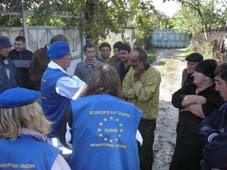Russia claims Tbilisi is creating provocations in conflict zone
By Mzia Kupunia
Monday, August 3

The statement followed claims by the Russian Defence Ministry that Tskhinvali and its adjacent territories have been shelled from the Georgian side. “Russia maintains the right to use all possibilities to defend the citizens of Ossetia and the military servicemen located on South Ossetian territory,” a Russian Defence Ministry statement reads. The Ministry alleges that from July 29 to August 1 the “capital of South Ossetia” was shelled by mortars and grenade-launchers several times. Russian sources also claim that the observation post of the de facto South Ossetian military forces came under fire. The Russian Defence Ministry has assessed these incidents as “provocation” and “an attempt by Georgian officials to escalate the situation in the region.”
The Russian statement draws some parallels between the situation now and last year. “Events developed in an analogical way in August 2008, and led to Georgia’s military aggression against South Ossetia and an attack on Russian peacekeepers,” the Russian Defence Ministry stated, warning it would use “all available force” to defend the residents of South Ossetia and Russian servicemen.
Georgian officials have denied Russian and Ossetian allegations that the village of Eredvi, currently controlled by South Ossetian militia, was shelled from the village of Ditsi in the Gori region. They say there has been no shooting in the conflict zone. Head of the Shida Kartli regional police department Vladimer Jugheli has said that, apart from some shooting coming from Tskhinvali which was aimed in the direction of the village of Nikozi, there was no shooting on July 29. “This statement is yet another provocation,” Jugheli noted. The EU Monitoring Mission has confirmed the Georgian side’s statement. EUMM has stated that the EU observers have seen no evidence to confirm any kind of firing towards Tskhinvali or its adjacent territories. The EUMM has stated that in order to give a better assessment of the situation it is necessary to have access to the territories controlled by the de facto South Ossetian authorities.
Meanwhile the Georgian Foreign Ministry has reported that a military aerodrome is being built in the village of Ikoti, in the Akhalgori region. It says the aerodrome, which is close to the historic Mukhranbatoni Palace which is now the site of a nunnery will endanger the “existence of an important historical monument”, adding that some more heritage monuments near Ikoti will also be put in danger, including the 8th century church, the St George and St. Marina churches and Tsirkoli Castle. The Georgian side has assessed this as a “logical continuation of ethnic cleansing”, an act designed to destroy the Georgian population and their cultural heritage on the occupied territories.
“Russia is violating international norms and declarations about defending of cultural heritage,” the Georgian Foreign Ministry has said, calling on the international community to use all levers to stop this “intentional” destruction.
